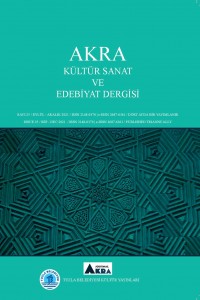Abstract
References
- Akarsu, Bedia (1994), Felsefe Terimleri Sözlüğü, İnkılap Kitabevi, İstanbul.
- Alt, Peter Andre, (2016), Her Şeyin Başlangıcı: Şeytanın Düşüşü ve Kötünün Doğuşu, Sel Yayıncılık, İstanbul.
- Arendt, Hannah (2009), Kötülüğün Sıradanlığı, çev. Özge Çelik, Metis Yayıncılık, İstanbul.
- Atabek, Erdal (1989), Kışkırtılmış Erkeklik Bastırılmış Kadınlık, Altın Kitaplar Yayınevi, İstanbul.
- Bataille, Georges (1993), Erotizm. Onur Yayıncılık, Ankara.
- Bataille, Georges (2004), Edebiyat ve Kötülük, çev. Ayşegül Sönmezay, Ayrıntı Yayınları, İstanbul.
- Bourdieu, Pierre (2018), Eril Tahakküm, çev. Bediz Yılmaz. Bağlam Yayıncılık, İstanbul.
- Durkheim, Emile (2002), İntihar, çev. Özer Ozankaya, Cem yayınları, İstanbul.
- Eagleton, Teryy (2012), Kötülük Üzerine Bir Deneme, çev. Şenol Bezci, İletişim Yayınları, İstanbul.
- Eagleton, Teryy (2017), İyimser Olmayan Umut, çev. Emine Ayhan, Ayrıntı Yayınları İstanbul.
- Gürbilek, Nurdan (2012), Kötü Çocuk Türk, Metis Yayınları, İstanbul.
- Gürbilek, Nurdan (2013), Mağdurun Dili. Metis Yayınları, İstanbul.
- Kaçan, Metin (2012), Ağır Roman, Everest Yayınları, İstanbul.
- Ozankaya, Özer (1995), Temel Toplumbilim Terimleri Sözlüğü, Cem Yayınevi, İstanbul.
- Şen Sönmez, Ürün (2016). Türk Romanında Kötülük – Başlangıçtan 1950’ye, Yitik Ülke Yayınları, İstanbul.
- Werner, Charles (2000), Kötülük Problemi, Kaknüs Yayınları, İstanbul.
Abstract
Since the existence of humanity, many ideas have been put forward on the concepts of ‘evil’ and ‘evilness’. The aforementioned concepts, which have an effect on philosophical, religious and literary works, are also discussed in Metin Kaçan’s work named Cholera Street (1990). Accordingly, in our study, it was aimed to scrutinize Metin Kaçan’s work titled Cholera Street on the basis of Terry Eagleton’s views on the concepts of “evil” and “evilness.” As a result of the study, it was determined that that it is possible to associate Eagleton’s theses about the source of evil with the murder and suicide incidents in Cholera Street. Events in the novel develop along the axis of the ‘good-evil’ contrast. The perception that the threat of the good being under the threat of the evil is inevitable is problematized throughout the novel, both by the characters of the novel and the course of the events. In Cholera, which constitutes the main venue of the work, murder, sexual perversion, theft, violence and crime are presented as common phenomena in the flow of daily life. In the novel, many fragments of incidents were observed in which the evil is manifested as an affirmative element. It was determined that the concept of the good and the evil is shaped not according to general acceptances, but in line with the perceptions of the inhabitants of Cholera. With this aspect, the work has a stance against the understanding that glorifies the good and demonizes the evil.
References
- Akarsu, Bedia (1994), Felsefe Terimleri Sözlüğü, İnkılap Kitabevi, İstanbul.
- Alt, Peter Andre, (2016), Her Şeyin Başlangıcı: Şeytanın Düşüşü ve Kötünün Doğuşu, Sel Yayıncılık, İstanbul.
- Arendt, Hannah (2009), Kötülüğün Sıradanlığı, çev. Özge Çelik, Metis Yayıncılık, İstanbul.
- Atabek, Erdal (1989), Kışkırtılmış Erkeklik Bastırılmış Kadınlık, Altın Kitaplar Yayınevi, İstanbul.
- Bataille, Georges (1993), Erotizm. Onur Yayıncılık, Ankara.
- Bataille, Georges (2004), Edebiyat ve Kötülük, çev. Ayşegül Sönmezay, Ayrıntı Yayınları, İstanbul.
- Bourdieu, Pierre (2018), Eril Tahakküm, çev. Bediz Yılmaz. Bağlam Yayıncılık, İstanbul.
- Durkheim, Emile (2002), İntihar, çev. Özer Ozankaya, Cem yayınları, İstanbul.
- Eagleton, Teryy (2012), Kötülük Üzerine Bir Deneme, çev. Şenol Bezci, İletişim Yayınları, İstanbul.
- Eagleton, Teryy (2017), İyimser Olmayan Umut, çev. Emine Ayhan, Ayrıntı Yayınları İstanbul.
- Gürbilek, Nurdan (2012), Kötü Çocuk Türk, Metis Yayınları, İstanbul.
- Gürbilek, Nurdan (2013), Mağdurun Dili. Metis Yayınları, İstanbul.
- Kaçan, Metin (2012), Ağır Roman, Everest Yayınları, İstanbul.
- Ozankaya, Özer (1995), Temel Toplumbilim Terimleri Sözlüğü, Cem Yayınevi, İstanbul.
- Şen Sönmez, Ürün (2016). Türk Romanında Kötülük – Başlangıçtan 1950’ye, Yitik Ülke Yayınları, İstanbul.
- Werner, Charles (2000), Kötülük Problemi, Kaknüs Yayınları, İstanbul.
Abstract
References
- Akarsu, Bedia (1994), Felsefe Terimleri Sözlüğü, İnkılap Kitabevi, İstanbul.
- Alt, Peter Andre, (2016), Her Şeyin Başlangıcı: Şeytanın Düşüşü ve Kötünün Doğuşu, Sel Yayıncılık, İstanbul.
- Arendt, Hannah (2009), Kötülüğün Sıradanlığı, çev. Özge Çelik, Metis Yayıncılık, İstanbul.
- Atabek, Erdal (1989), Kışkırtılmış Erkeklik Bastırılmış Kadınlık, Altın Kitaplar Yayınevi, İstanbul.
- Bataille, Georges (1993), Erotizm. Onur Yayıncılık, Ankara.
- Bataille, Georges (2004), Edebiyat ve Kötülük, çev. Ayşegül Sönmezay, Ayrıntı Yayınları, İstanbul.
- Bourdieu, Pierre (2018), Eril Tahakküm, çev. Bediz Yılmaz. Bağlam Yayıncılık, İstanbul.
- Durkheim, Emile (2002), İntihar, çev. Özer Ozankaya, Cem yayınları, İstanbul.
- Eagleton, Teryy (2012), Kötülük Üzerine Bir Deneme, çev. Şenol Bezci, İletişim Yayınları, İstanbul.
- Eagleton, Teryy (2017), İyimser Olmayan Umut, çev. Emine Ayhan, Ayrıntı Yayınları İstanbul.
- Gürbilek, Nurdan (2012), Kötü Çocuk Türk, Metis Yayınları, İstanbul.
- Gürbilek, Nurdan (2013), Mağdurun Dili. Metis Yayınları, İstanbul.
- Kaçan, Metin (2012), Ağır Roman, Everest Yayınları, İstanbul.
- Ozankaya, Özer (1995), Temel Toplumbilim Terimleri Sözlüğü, Cem Yayınevi, İstanbul.
- Şen Sönmez, Ürün (2016). Türk Romanında Kötülük – Başlangıçtan 1950’ye, Yitik Ülke Yayınları, İstanbul.
- Werner, Charles (2000), Kötülük Problemi, Kaknüs Yayınları, İstanbul.
Details
| Primary Language | Turkish |
|---|---|
| Subjects | Creative Arts and Writing |
| Journal Section | Review Articles |
| Authors | |
| Publication Date | September 20, 2021 |
| Acceptance Date | June 5, 2021 |
| Published in Issue | Year 2021 Volume: 9 Issue: 25 |


